<Back to Index>
- Psychologist Daniel Kahneman, 1934
- Psychologist Amos Nathan Tversky, 1937
PAGE SPONSOR
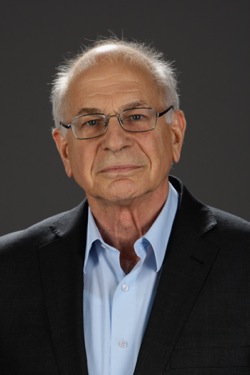
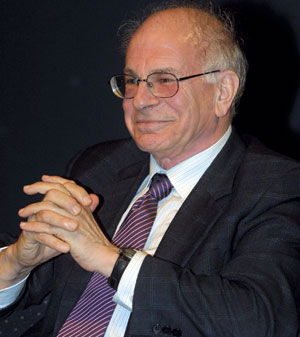
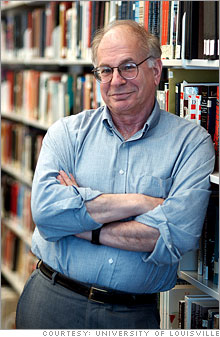
Daniel Kahneman (Hebrew: דניאל כהנמן) (born March 5, 1934) is an Israeli - American psychologist and winner of the Sveriges Riksbank Prize in Economic Sciences in Memory of Alfred Nobel. He is known for his work on the psychology of judgment and decision - making, behavioral economics and hedonic psychology.
With Amos Tversky and others, Kahneman established a cognitive basis for common human errors using heuristics and biases and developed prospect theory. He was awarded the 2002 Nobel Memorial Prize in Economics for his work in prospect theory.
In 2011, he was named by Foreign Policy magazine to its list of top global thinkers. In the same year, his book Thinking, Fast and Slow, which summarizes much of his research, was published and became a best seller.
He was professor emeritus of psychology and public affairs at Princeton University's Woodrow Wilson School. Kahneman was a founding partner of The Greatest Good, a business and philanthropy consulting company. He was married to Royal Society Fellow Anne Treisman.
Daniel Kahneman was born in Tel Aviv in 1934, where his mother was visiting relatives. He spent his childhood years in Paris, France, where his parents had emigrated from Lithuania in the early 1920s.
Kahneman and his family were in Paris when it was occupied by Nazi Germany in 1940. His father was picked up in the first major round up of French Jews, but was released after six weeks due to the intervention of his employer. The family was on the run for the remainder of the war, and survived intact except for the death of Kahneman's father of diabetes in 1944. Daniel Kahnemann and his family then moved to the British Mandatory Palestine in 1948, just prior to Israel's independence.
Kahneman has written of his experience in Nazi occupied France, explaining in part why he entered the field of psychology:
It must have been late 1941 or early 1942. Jews were required to wear the Star of David and to obey a 6 p.m. curfew. I had gone to play with a Christian friend and had stayed too late. I turned my brown sweater inside out to walk the few blocks home. As I was walking down an empty street, I saw a German soldier approaching. He was wearing the black uniform that I had been told to fear more than others – the one worn by specially recruited SS soldiers. As I came closer to him, trying to walk fast, I noticed that he was looking at me intently. Then he beckoned me over, picked me up, and hugged me. I was terrified that he would notice the star inside my sweater. He was speaking to me with great emotion, in German. When he put me down, he opened his wallet, showed me a picture of a boy, and gave me some money. I went home more certain than ever that my mother was right: people were endlessly complicated and interesting.
Kahneman received his B.Sc. with a major in psychology and a minor in mathematics from the Hebrew University of Jerusalem in 1954. After earning his undergraduate degree, he served in the psychology department of the Israeli Defense Forces. One of his responsibilities was to evaluate candidates for officer's training school, and to develop tests and measures for this purpose. In 1958, he went to the United States to study for his Ph.D. degree in Psychology from the University of California, Berkeley.
Kahneman began his academic career as a lecturer in psychology at the Hebrew University of Jerusalem in 1961. He was promoted to senior lecturer in 1966.
His early work focused on visual perception and attention. For example, his first publication in the prestigious journal Science was entitled "Pupil Diameter and Load on Memory" (Kahneman & Beatty, 1966). During this period, Kahneman was a visiting scientist at the University of Michigan (1965 – 66) and the Applied Psychological Research Unit in Cambridge (1968 / 1969, summers). He was a fellow at the Center for Cognitive Studies and a lecturer in psychology at Harvard University in 1966 / 1967.
This period marked the beginning of Kahneman's lengthy collaboration with Amos Tversky. Together, Kahneman and Tversky published a series of seminal articles in the general field of judgment and decision making, culminating in the publication of their prospect theory in 1979. Kahneman was awarded the Nobel Memorial Prize in Economics in 2002 for his work on prospect theory, and it is generally regarded as a given that Tversky would also have received the prize had he still been alive (he died in 1996).
In his Nobel biography, Kahneman stated that his collaboration with Tversky began after Kahneman had invited Tversky to give a guest lecture to one of Kahneman's seminars at Hebrew University in 1968 or 1969. Their first jointly authored paper, "Belief in the Law of Small Numbers," was published in 1971. They published seven articles in peer reviewed journals in the years 1971 – 1979. Aside from "Prospect Theory," the most important of these articles was "Judgment Under Uncertainty: Heuristics and Biases" (Tversky & Kahneman, 1974), which was published in the prestigious journal Science and introduced the notion of anchoring.
Kahneman left Hebrew University in 1978 to take a position at the University of British Columbia. This move had little or no immediate effect on his collaborations with Tversky, for Tversky moved on to Stanford University that same year.
Kahneman and Tversky were both fellows at the Center for Advanced Studies in the Behavioral Sciences at Stanford University in the academic year 1977 – 1978. A young economist named Richard Thaler was a visiting professor at the Stanford branch of the National Bureau of Economic Research during that same year. According to Kahneman, "[Thaler and I] soon became friends, and have ever since had a considerable influence on each other's thinking". Building on Prospect theory and Kahneman and Tversky's body of work, Thaler published "Toward a Positive Theory of Consumer Choice" in 1980, a paper which Kahneman has called "the founding text in behavioral economics".
Kahneman and Tversky both became heavily involved in the development of this new approach to economic theory, and their involvement in this movement had the effect of reducing the intensity and exclusivity of their earlier period of joint collaboration. Although they would continue to publish together until the end of Tversky's life, their years of near - exclusive collaboration were coming to an end.
The period when Kahneman published almost exclusively with Tversky began to wind down in 1983, when Kahneman published two papers with Anne Treisman, his wife since 1978.
In the nineties, Kahneman's research focus began to gradually shift in emphasis towards the field of "hedonic psychology." This subfield is closely related to the positive psychology movement, which was steadily gaining in popularity at the time. According to Kahneman and colleagues,
"Hedonic psychology... is the study of what makes experiences and life pleasant or unpleasant. It is concerned with feelings of pleasure and pain, of interest and boredom, of joy and sorrow, and of satisfaction and dissatisfaction. It is also concerned with the whole range of circumstances, from the biological to the societal, that occasion suffering and enjoyment."
It is difficult to determine precisely when Kahneman's research began to focus on hedonics, although it likely stemmed from his work on the economic notion of utility. After publishing multiple articles and chapters in all but one of the years spanning the period 1979 – 1986 (for a total of 23 published works in 8 years), Kahneman published exactly one chapter during the years 1987 – 1989. After this hiatus, articles on utility and the psychology of utility began to appear. In 1992, Varey and Kahneman introduced the method of evaluating moments and episodes as a way to capture "experiences extended across time." While Kahneman continued to study decision making, hedonic psychology was the focus of an increasing number of publications, culminating in a volume co-edited with Ed Diener and Norbert Schwarz, two of the most established and esteemed scholars of affect and well being.
Together with David Schkade, Kahneman developed the notion of the focusing illusion to explain in part the mistakes people make when estimating the effects of different scenarios on their future happiness (also known as affective forecasting, which has been studied extensively by Daniel Gilbert). The "illusion" occurs when people consider the impact of one specific factor on their overall happiness, they tend to greatly exaggerate the importance of that factor, while overlooking the numerous other factors that would in most cases have a greater impact. A good example is provided by Kahneman and Schkade's 1998 paper "Does living in California make people happy? A focusing illusion in judgments of life satisfaction." In that paper, students in the Midwest and in California reported similar levels of life satisfaction, but the Midwesterners thought their Californian peers would be happier. The only distinguishing information the Midwestern students had when making these judgments was the fact that their hypothetical peers lived in California. Thus, they "focused" on this distinction, thereby overestimating the effect of the weather in California on its residents' satisfaction with life.
Kahneman became a senior scholar and faculty member emeritus at Princeton University's Department of Psychology and Woodrow Wilson School of Public and International Affairs. He was also a fellow at Hebrew University and a Gallup Senior Scientist.
Daniel Kahneman was married to Anne Treisman, fellow professor of psychology at Princeton University.
- In 2002, Kahneman received the Nobel Memorial Prize in Economics, despite being a research psychologist, for his work in Prospect theory. Kahneman stated he has never taken a single economics course – that everything that he knows of the subject he and Tversky learned from their collaborators Richard Thaler and Jack Knetsch.
- Kahneman, co-recipient with Amos Tversky, earned the 2003 University of Louisville Grawemeyer Award for Psychology.
- In 2005, he was voted the 101st greatest Israeli of all time, in a poll by the Israeli news website Ynet to determine whom the general public considered the 200 Greatest Israelis.
- In 2007, he was presented with the American Psychological Association's Award for Outstanding Lifetime Contributions to Psychology.
- On November 6, 2009, he was awarded an honorary doctorate from the department of Economics at Erasmus University in Rotterdam, the Netherlands. In his acceptance speech Kahneman said, "when you live long enough, you see the impossible become reality." He was referring to the fact that he would never have expected to be honored as an economist when he started his studies into what would become Behavioral Economics.
- In 2011, he made the Bloomberg 50 most influential people in global finance.
- On November 9, 2011, he was awarded the Talcott Parsons Prize by the American Academy of Arts and Sciences.
- His book, Thinking, Fast and Slow was the winner of the 2011 Los Angeles Times Book Award for Current Interest.
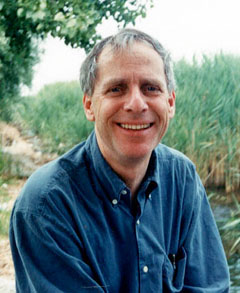
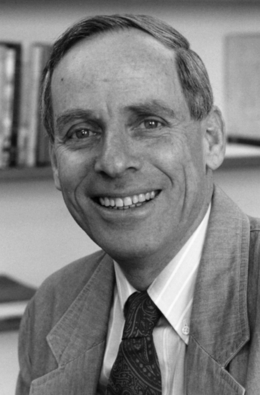
Amos Nathan Tversky, (Hebrew: עמוס טברסקי; March 16, 1937 – June 2, 1996) was a cognitive and mathematical psychologist, a pioneer of cognitive science, a longtime collaborator of Daniel Kahneman, and a key figure in the discovery of systematic human cognitive bias and handling of risk. Much of his early work concerned the foundations of measurement. He was co-author of a three - volume treatise, Foundations of Measurement (recently reprinted). His early work with Kahneman focused on the psychology of prediction and probability judgment. Amos Tversky and Daniel Kahneman worked together to develop prospect theory, which aims to explain irrational human economic choices and is considered one of the seminal works of behavioral economics. Six years after Tversky's death, Kahneman received the 2002 Nobel Prize in Economics for the work he did in collaboration with Amos Tversky. (The prize is not awarded posthumously.) Kahneman told The New York Times in an interview soon after receiving the honor: "I feel it is a joint prize. We were twinned for more than a decade." Tversky also collaborated with Thomas Gilovich, Itamar Simonson, Paul Slovic and Richard Thaler in several key papers.
Tversky was born in Haifa, British Palestine (now Israel). He served with distinction in Israel Defense Forces rising to a rank of captain and was decorated for bravery. He received his undergraduate education at Hebrew University of Jerusalem, Israel, and his doctorate from the University of Michigan in Ann Arbor in 1964. He later taught at the Hebrew University, Israel, before moving to Stanford University. In 1980 he became a fellow of the American Academy of Arts and Sciences. In 1984 he was a recipient of the MacArthur Fellowship, and in 1985 he was elected to the National Academy of Sciences. Amos Tversky was married to Barbara Tversky, a professor in the human development department at Teachers College, Columbia University. Tversky, co-recipient with Daniel Kahneman, earned the 2003 University of Louisville Grawemeyer Award for Psychology. He died of a metastatic melanoma.
Tversky and Fox (1995) addressed ambiguity aversion, the idea that people do not like ambiguous gambles or choices with ambiguity, with the comparative ignorance framework. Their idea was that people are only ambiguity averse when their attention is specifically brought to the ambiguity by comparing an ambiguous option to an unambiguous option. For instance, people are willing to bet more on choosing a correct colored ball from an urn containing equal proportions of black and red balls than an urn with unknown proportions of balls when evaluating both of these urns at the same time. However, when evaluating them separately, people are willing to bet approximately the same amount on either urn. Thus, when it is possible to compare the ambiguous gamble to an unambiguous gamble people are averse — but not when one is ignorant of this comparison.